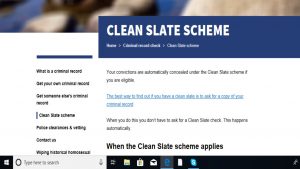
(Screenshot of the Main Page of New Zealand’s “Clean slate Scheme”)
What happens to a person long after committing a criminal offense? Once a person has paid all obligations (prison, probation, fine) the charge still follows them around, right? Well, yes and no. While the convictions themselves do not disappear, there are options for getting the person back into society. Since a record limits people’s prospect for travel, work, education, adoption, etc… there are ways to get around this depending on the circumstances.
This article looks at 5 Common Law Countries: (a) UK; (b) US; (c) Canada; (d) Australia; and (e) New Zealand.
(a) UK: Spent convictions
Here is a link to the U.K. branch. The 1974 rehabilitation of offenders act refers to charges as ”spent” or ”unspent”. Spent charges are to have no impact on the person in most circumstances.
The waiting period differs. For example, community orders are spent a year after they are completed. Custody sentences range from 2 years, to 4 years, to 7 years, to permanently ineligible.
Also, the act has been amended. It used to be 30 months was the cut off period for charges being spent. It is now 48 months (4 years).
(b) US: Pardons
Click Here for more information.
This is still largely a political process, and can be done at the State level (by a Governor), or at the Federal level (by the President). Critics however believe that it largely leads to political and connected people getting the break. Those with minor charges do still get them often.
(c) Canada: Pardons, a.k.a. “Record Suspensions”
Click Here for the National Parole Board
For summary (misdemeanors) it is 5 years after the sentence is served
For indictable (felonies) it is 10 years after sentence is served.
In 2010 the rules were changed to prevent longer term and series criminals from getting their records sealed. Notorious pedophile Graham James discovered to have gotten one. This was 2010, and the rallying cry for reform became ”pass these reforms, or Karla Homolka also gets a pardon”.
However, those have been struck down for Ontario and BC residents, at least as far as those who finished a sentence before 2010. See here.
Note: to Canadian traveller’s going to the US — Homeland Security specifically says it does not recognise a Canadian pardon/suspension and a waiver must still be applied for.
One other thing of note: there are restrictions on those who can get one, (a) anyone serving a life sentence; (b) anyone declared a dangerous offender; (c) those with 3 or more felonies if they resulted in 2+ years in prison; (d) sex offences are still flagged in vulnerable persons checks; (e) drug trafficking if still flagged in U.S. access.
(d) Australia: Spent Convictions
Click Here for the link to the Australian site.
Australia ”spends” convictions, though it appears that the rules differ somewhat if the crime was committed in Australia v.s. abroad
(e) New Zealand: Clean Slate Scheme
Click Here, and also Click Here for information on the New Zealand site.
This scheme only refers to NZ society, and acknowledges that it isn’t recognized in many other places.
In order to be eligible, no jail sentence must ever have been imposed.
SOME THOUGHTS
This looked at 5 Common Law Countries: UK/US/Australia/New Zealand and Canada. While the result is much the same, one major difference is that the US system seems to be politically based.
Still, good news for those looking to move on. Doing something stupid (any fairly minor), shouldn’t be a lifetime hinderance for people looking to rebuild their lives.
In almost all circumstances, a pardon/suspension/spending can be revoked if the person commits more crimes. Makes sense, as its intended use is for people who have moved on. According to sources within the Canadian justice system, 96% of people who get a record seal do not commit other crimes. That is 24 out of every 25 people. Being able to clear a record is helpful for the vast majority of people.
Understandably, it does upset some people that ex-cons are able to seal or move on afterwards. In particular, many victims and their families take issue with this. And depending on the circumstances, they are absolutely right. However, these options seem much more geared towards minor offences and not towards serious, repeat offenders.
The 5 Common Law countries listed here all have this option, to varying degrees. Not sure where else it exists, but worth a close look.
